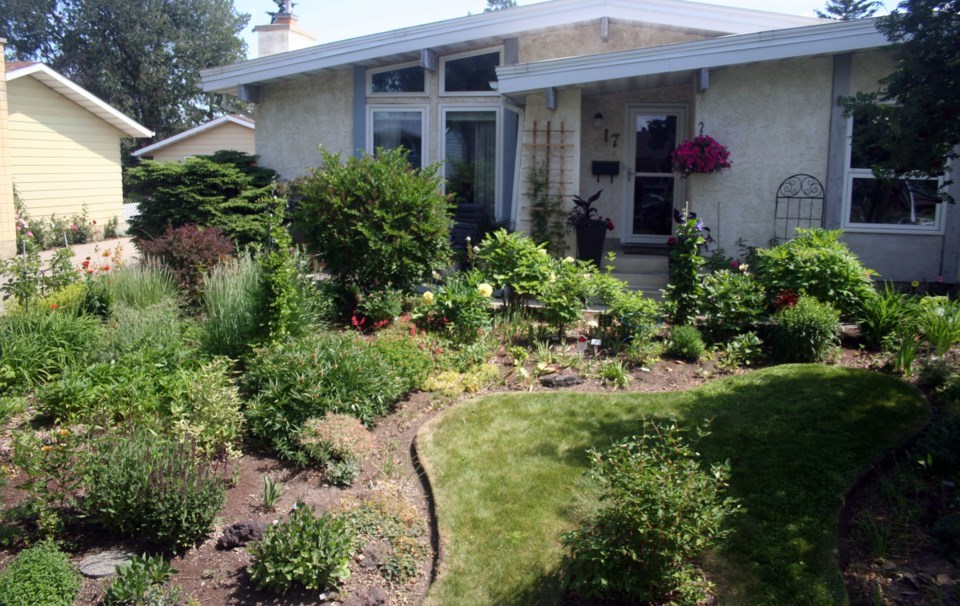Alternative lawns could soon be growing in a neighbourhood near you.
St. Albert city council narrowly voted last week to have city staff comb through city bylaws for any amendments needed to allow more residents to have alternative front lawns.
The vote, a result of a motion put forward by Coun. Natalie Joly, passed with Coun. Shelley Biermanski, Coun. Sheena Hughes, and Coun. Mike Killick opposed.
City staff will scan city policies for any changes necessary to “allow residential landowners a wider scope of permissible vegetation and landscaping options on their properties ... than is currently allowed under the community standards bylaw, including alternatives such as food crops, pollinating gardens, rain gardens, and xeriscaping," read the motion.
Joly said alternative lawns, which can be considered anything other than just grass, have many benefits, including increased water permeability to handle more stormwater and avoid runoff; increased sources of pollen for bees and other pollinators; and lessened greenhouse gas emissions through reduced use of gas-powered lawn mowers.
“All of those are ticks in terms of our commitment to the environment,” she said. “It's an opportunity for people to learn about the impacts of those habits that we've formed in terms of fertilizing our lawns and putting poison on our lawns.”
The only city bylaw that may need to be amended is the community standards bylaw, “which requires land to not be in a nuisance state in the opinion of a peace officer," an administrative report to council says after an initial scan.
“Nuisance means a serious disregard for general maintenance and upkeep and includes grass or weeds that are longer than 15 centimetres, unless it forms part of a naturalized area,” the report continues.
“‘Naturalized area’ means an area of land within which, in the sole opinion of a peace officer, there exists or has been practised a method of random garden plant distribution that stimulates the growth of plants in the natural environment, and does not include any nuisance, noxious or restricted weeds as identified in the Weed Control Act; and is not located in the front yard of a property.”
Along with the preliminary scan of existing bylaw limitations, the report to council says administration has already created a list of potential benefits and challenges with allowing a greater variety of lawn practices.
For potential benefits, administration noted pollinators will benefit from increased pollen sources and habitats; lower amounts of herbicide would be used; reduced greenhouse gas emissions from reduced use of gas-powered lawn mowers; and “improvements to water quality in the river from surface runoff.”
For potential challenges, administration thinks there may be community push-back because of ingrained beliefs that lawns must be “neat and tidy”; and any changes may work against existing crime prevention measures, specifically referring to the "broken windows" theory that postulates areas that appear run down or in disrepair spurs criminal activity.
During council's debate on Oct. 3, Joly cited council's own list of strategic priorities, one of which reads that “council recognizes the need for adapting to a changing natural environment, and our focus will be on exploring innovated ways to reduce our footprint, protect waterways and green spaces, and ensure resilient social systems and infrastructure now and for future generations.”
Coun. Shelley Biermanski said she understood the intent of the motion, but was hesitant because she thought any necessary changes to city policy could lead to residents letting their yards “grow wild.”
“I think there's a reason why we have gardens traditionally in backyards — most people can do all kinds of experiments with something they're learning ... but the whole idea of changing the whole front yard of the whole community is a visual that we could never be able to go back from,” Biermanski said.
Similarly, Coun. Mike Killick said during debate that he didn't think the work to explore bylaw changes should be a priority for city staff, especially “on something that I foresee would not align with the vast majority of what residents would want their front yard to look like.”
Coun. Wes Brodhead argued this work should be a priority for administration, given the community standards bylaw has not been updated since 2010.
“I actually think this work should be done and that we should, as a council, start to wrestle with what does it really mean to be the community standard in our bylaw of 2023 or 2024,” Brodhead said.
“Community standards change over time and ideas change over time, and what was acceptable for my generation was probably not acceptable to the younger generation and vice versa — so what does it mean, then, to represent all of the city of St. Albert?”
Now the motion has passed, city staff is tasked with bringing any necessary bylaw changes to council for further debate sometime between April and July of next year.




